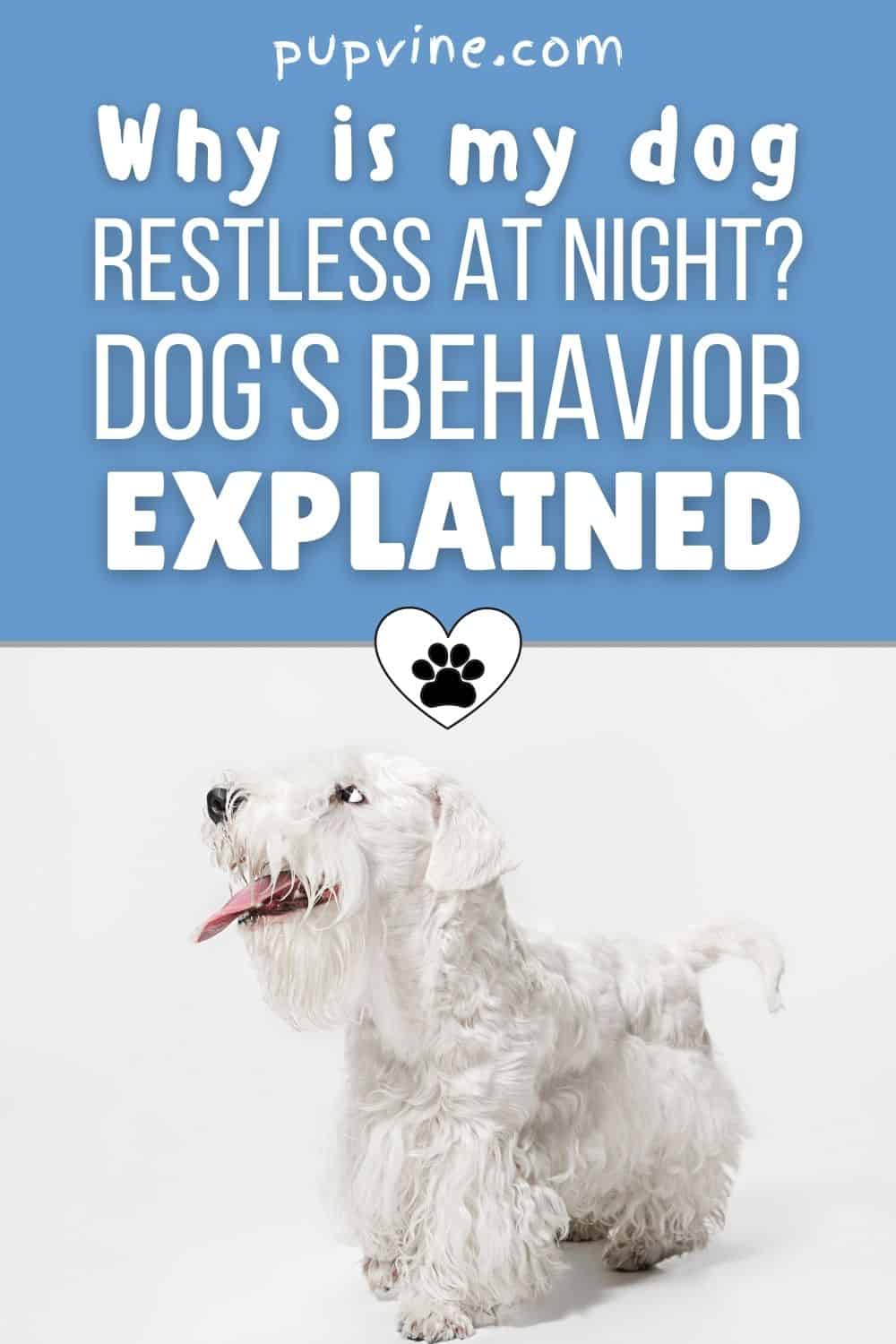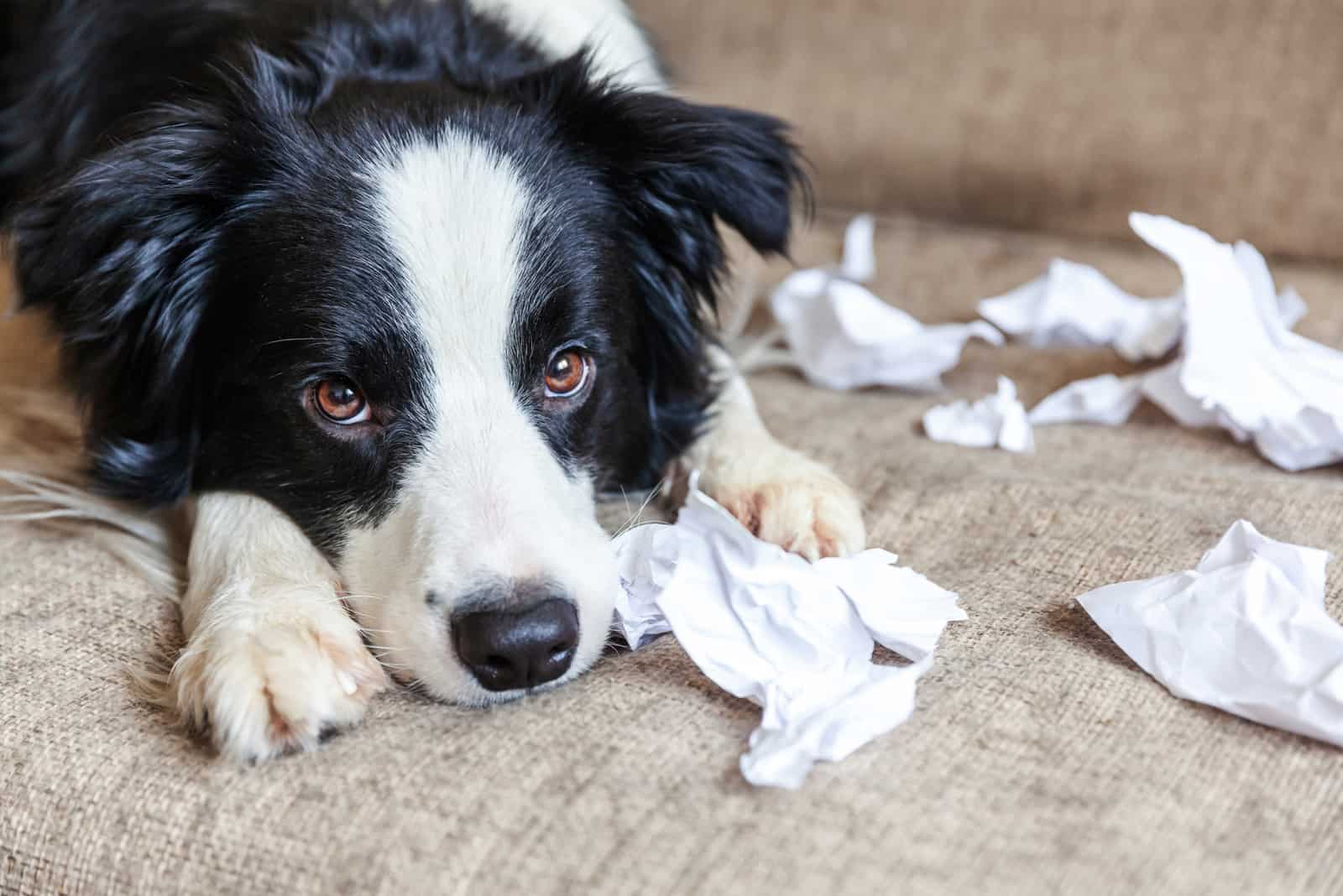Every dog owner will worry about their precious pooch at some point in their life. It just goes with the territory.
We accept that they might get sick once in a while, though we do our best to keep them healthy. We dread the possibility that they’ll get injured, and we strive to keep them safe from harm.
Our dogs become a part of the family, and as we get to know them, we begin to learn about their personality and character. We recognize their traits and quirks.
So when we notice that something is amiss, we become anxious and wonder what’s going on.
This can be the case when dog owners realize that their furry friends aren’t sleeping through the night and have become restless and agitated.
It’s a fairly common problem with several causes, some of which can be easily resolved.
If you are anxious about your dog’s behavior during the night and have noticed that they are restless, this guide will help you understand the problem and hopefully find a remedy.
Restless Puppies

First of all, restlessness at night isn’t always a sign that something is wrong. Puppies and younger dogs up to a year old can sometimes get very restless during the night-time hours, and this is quite normal and natural.
There isn’t usually anything wrong with them, and they will soon grow out of this behavior as the dog ages.
Remember, when a pup leaves the safety of the litter, this is a huge change for them that will take time to get used to.
To help you during this time, and to perhaps get a better night’s sleep, try out some of the following tips:
• Don’t have playtime right before bedtime – they’ll be hyped up and playful, which will make it difficult for them to settle.
• Make sure they get plenty of exercise during the day – they’ll be too tired to make a fuss!
• Have they peed and pooped? – it’s best to get them to ‘go potty’ just before bedtime to limit the need to go during the night.
• Give them a distraction – a favorite toy or two (preferably not squeaky ones, for the sake of your sanity!) might be a good distraction and stop them from bugging you.
• Are they comfortable? – make sure they have a soft place to sleep, with plenty of cushions or blankets.
Is the temperature right for them? If they’re too hot or too cold, then they’ll let you know about it! Is it too dark for them? Try installing a nightlight.
• Do they need company? – if all these methods fail, then it might just be that they miss your company.
Try moving their crate or bed closer to where you are sleeping. If they can sense that you are nearby, they’ll probably settle down and sleep.
Some people suggest that if your pup is making a fuss at night that you should ignore them, after which they will give up and go to sleep.
Even if you are able to ignore those sad cries, ignoring them might not be the best thing as it will most likely lead to a pattern of destructive behavior.
Common Causes Of Restlessness At Night
There are many reasons why your adult dog might be restless or suffer from sleepless nights, and not all of them are serious.
We’ll examine the most common causes here to help you get to the root of the problem.
Excess Energy
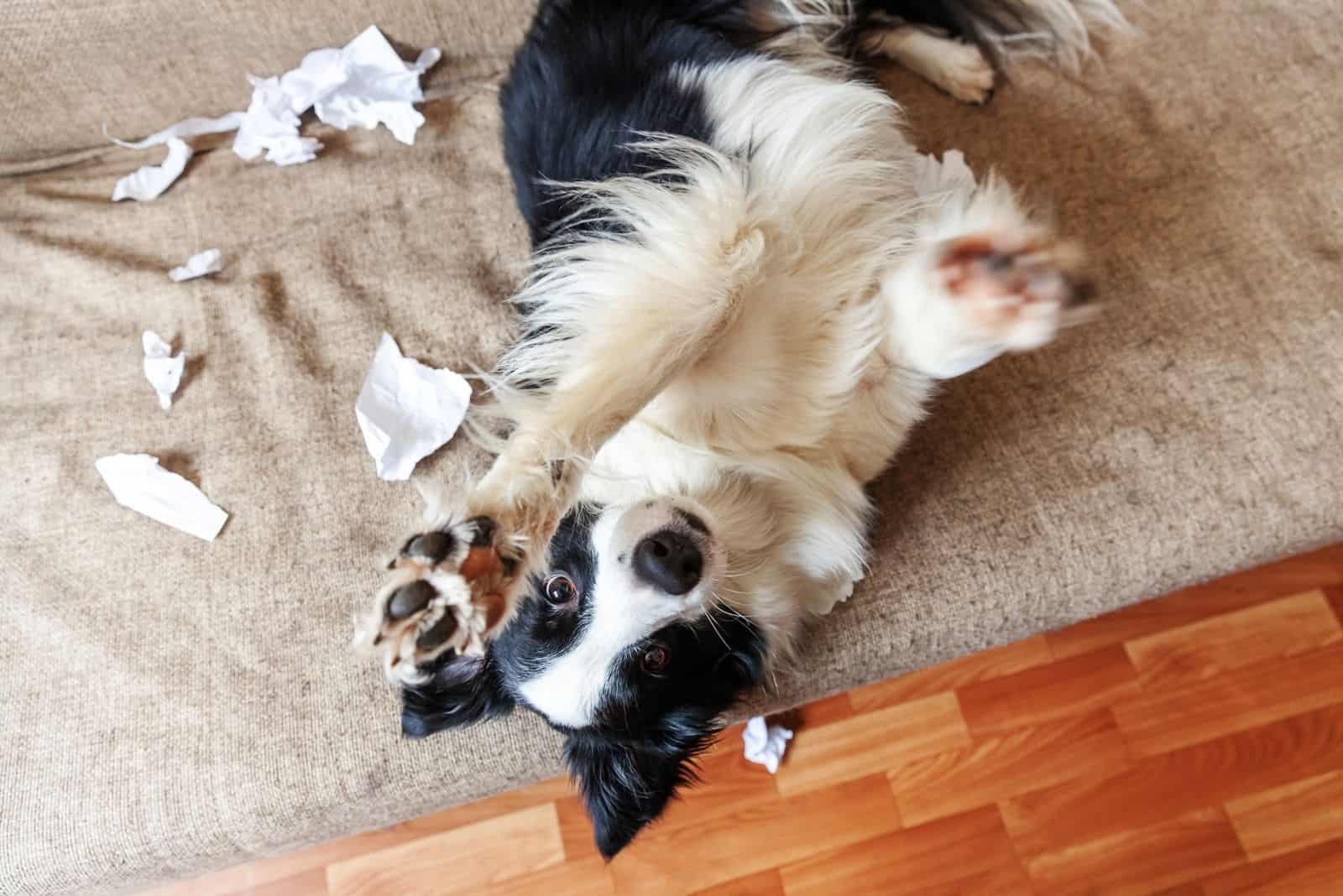
Whatever your dog’s age, they’ll need some exercise during the day. Healthy dogs require at least 20 minutes a day, and certain breeds will need significantly more.
And when you have an especially intelligent breed, this becomes even more important.
Dog behaviorists have linked a lack of exercise with an increase in anxiety. The more exercise they get, the less anxious they are.
Dogs that have been bred for their intelligence will quickly become bored if they don’t get enough physical and mental stimulation.
If that’s your dog, you’ll need to find ways of satisfying this need.
Don’t despair if you can’t think of anything, as there are tons of great ideas out there, including stuff like this:
• Enroll in dog training sessions.
• Enroll in agility classes or set up your own course at home.
• Teach your dog new tricks.
• Teach them the names of their toys.
• Create a scavenger hunt at home or in your yard.
• Make dinner time a ‘food hunt.’
• Play your own version of ‘find the pea.’
• Give them a job to do, such as helping with chores if possible.
• Replace old toys fairly regularly with new ones.
• Take your dog to new places.
As well as these, there are ‘brain teaser’ games you can buy for dogs that will keep them occupied.
Whether it’s a daily walk, playtime in the park, chasing a ball, a Frisbee – whatever the activity, you should make sure your dog gets the right amount of aerobic exercise every day.
As they say, a tired dog is a happy dog!
In case your dog simply refuses to walk, it would be the best to take it to the vet.
Anxiety
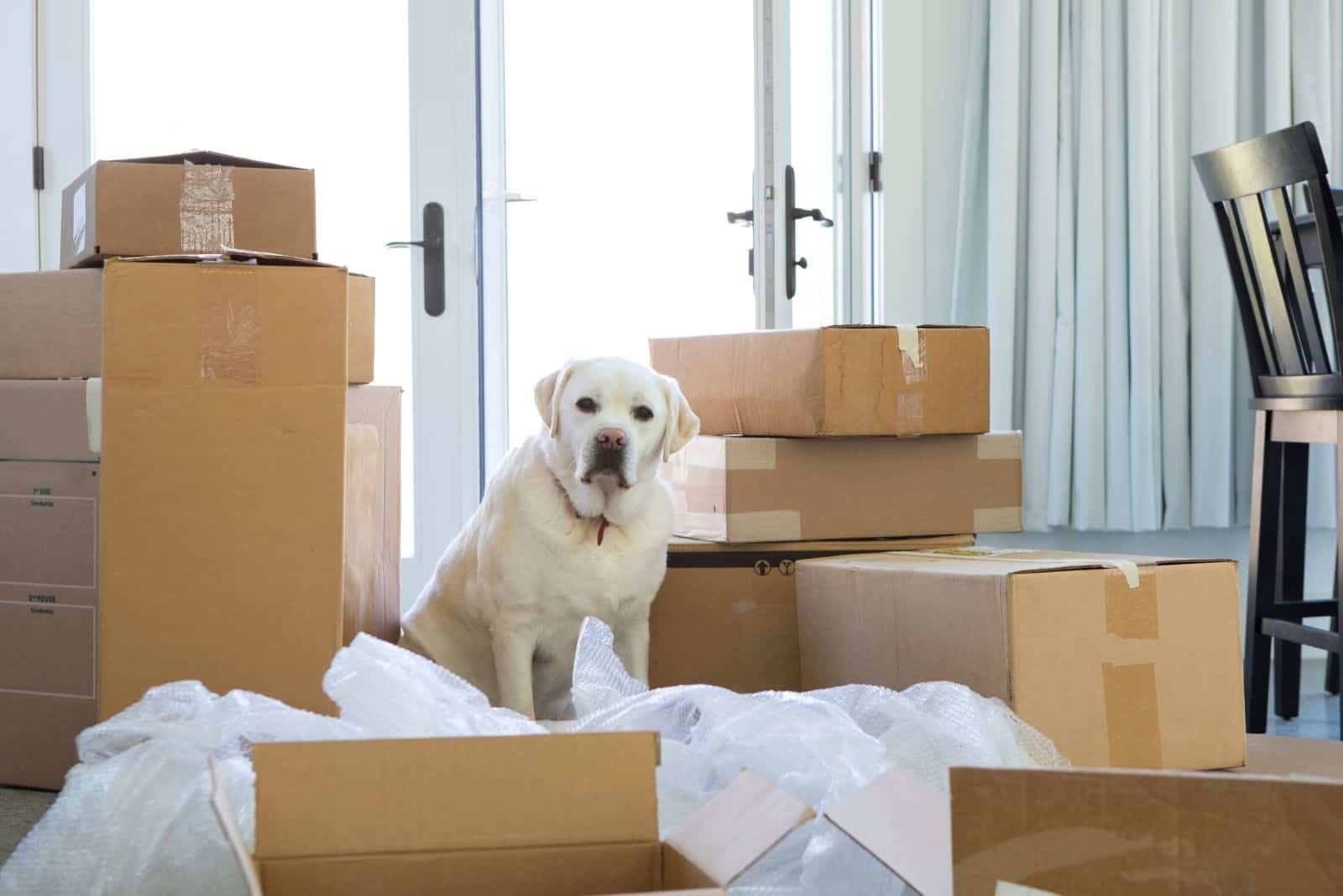
We touched on this above, as this can be connected with excess energy. However, there can be any number of reasons why a dog might be anxious.
Sadly, there’s no easy way of finding out what the cause is. It’s a question of applying common sense and your knowledge of your dog, ruling out each possibility until you reach the right conclusion.
To help you out, here are a few suggestions as to the possible cause:
• Bladder problems – older dogs may not have great bladder control and become restless at night because they need to urinate. Try taking them for a ‘bathroom break’ as late as you can.
• Changes in routine or circumstances – disruptions in your daily life, even minor ones, can lead to an anxious dog.
Moving house, new arrivals (kids, pets, guests, etc.), departures (death of family members, divorce, kids leaving home), or even simply moving the dog bed to another place, all of these factors can affect your dog’s behavior.
• Medical issues – if your dog has had any medical procedure or treatment, then they may feel anxious or behave differently.
This could be a reaction to any drugs or surgery, which is normal, but be sure to contact your veterinarian if things don’t improve.
• A change in diet – as you may know, our furry friends can be a fussy bunch! They don’t take well to change, including those related to their dog food. We’ll find out more in the next section.
• Thunderstorms – an obvious cause of anxiety, but worth mentioning. Dogs are sensitive to barometric pressure and may be able to sense a storm long before you have any idea it’s coming.
If your dog is scared of loud noises, then they’ll hate thunderstorms, even when they’re still distant.
Diet
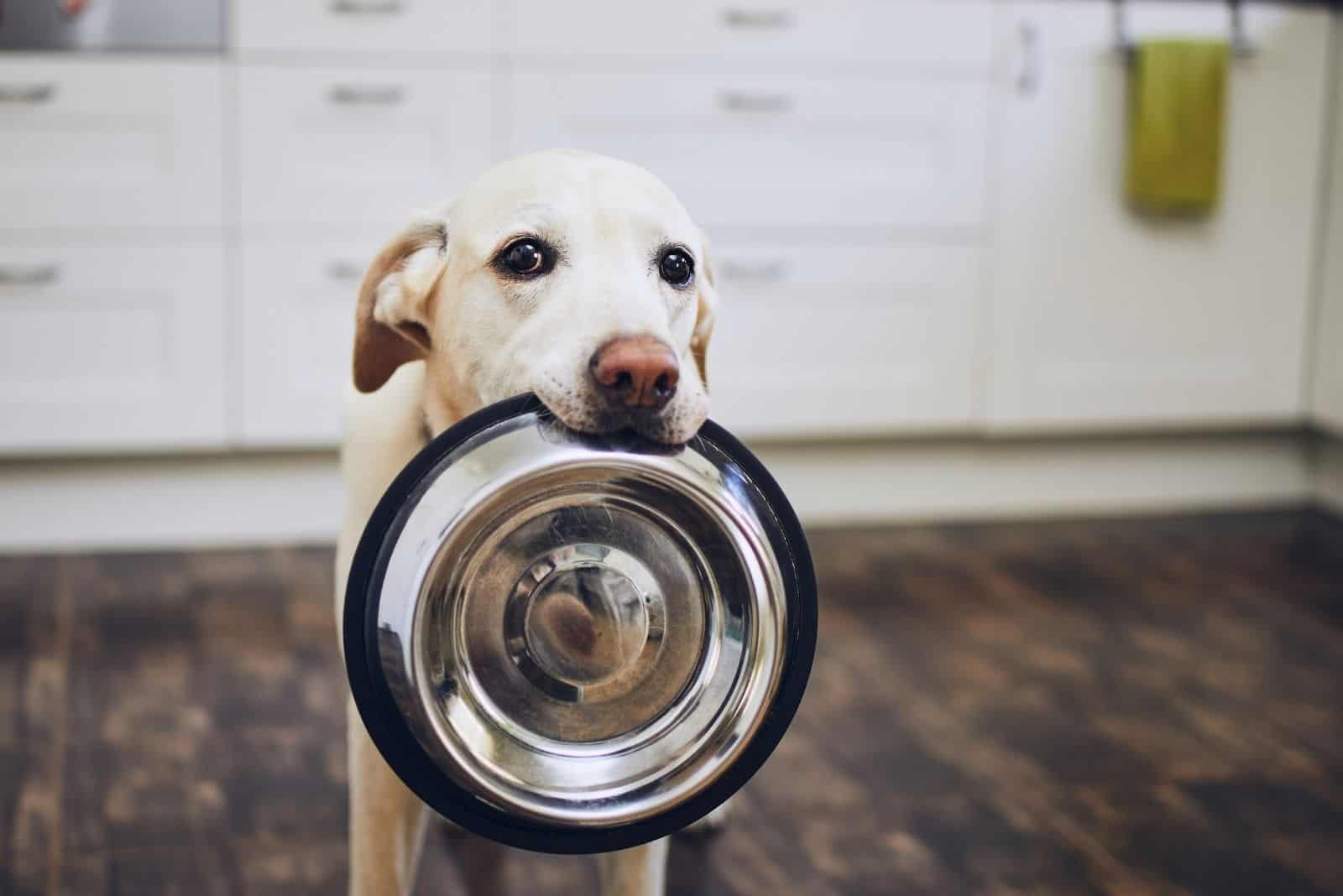
Have you recently changed your dog’s food? They might not be happy with it or could be sensitive to some of the new ingredients.
If it isn’t that, then it could be that you are feeding them too much, too little, or too late in the evening.
Check with your veterinarian for advice on the right quantity for your dog’s breed and weight, as well as for guidance on the best time to feed them.
If you notice white specks in your dog’s poop or your dog poops too much after certain foods, consider those alarming signs that something’s wrong.
Separation Anxiety
As with pups, your fur-baby might just want to be near you at night. They can’t see or hear you, which makes them unhappy.
It might help if you bring their dog bed into, or just outside, your bedroom. It’s safe to say that this won’t be a problem for most dog owners!
Medical Conditions
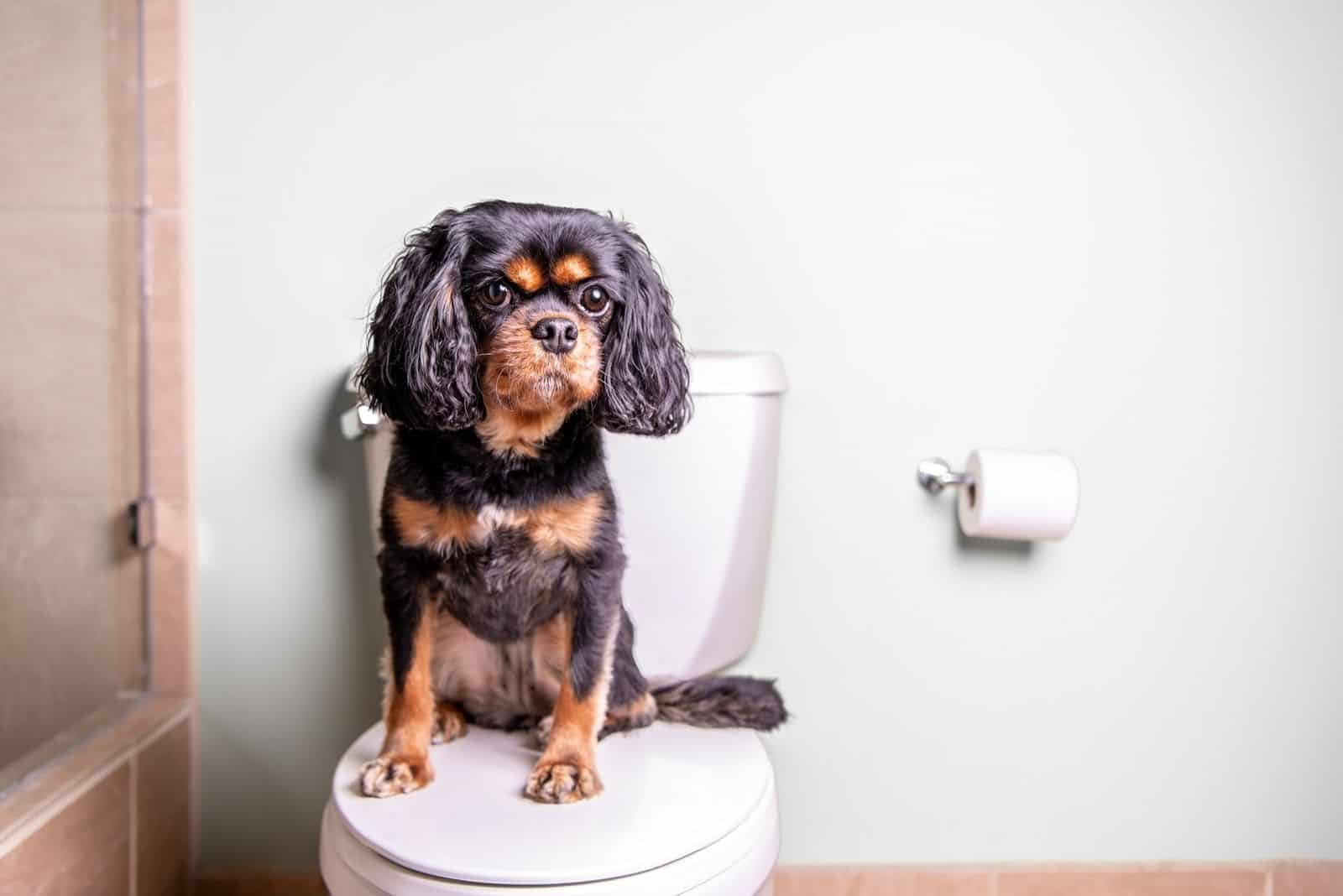
Several medical conditions could disrupt your dog’s sleeping patterns, so you’ll need to watch for any symptoms to determine what the problem is.
Old age, sadly, comes all too soon for our furry friends. Senior dogs can suffer from cognitive dysfunction, leading to a range of problems, including a disturbed sleep-wake cycle.
Other symptoms include disorientation, confusion, excessive licking, irritability, lack of playfulness, non-stop barking, loss of appetite, and incontinence.
The precise cause of cognitive dysfunction syndrome (CDS) is unknown, but what we do know is that the brain does tend to shrink with age.
Brain cells can become damaged and die, with minor strokes occurring from time to time.
There is no cure for CDS as such, but following a diagnosis (having performed a full examination to rule out any other medical cause), your vet will recommend a program of therapy that will improve your dog’s quality of life.
This routine will include playtime, exercise, and re-training.
You will be advised on the best diet, along with vitamin supplements, to boost your dog’s cognitive functions.
Your vet may also recommend certain drugs to ease anxiety, such as diazepam (Valium) or selegiline.
It will be your job to monitor their quality of life, as this is a degenerative condition. At some stage, you may have to make that heartbreaking decision to end their suffering.
Aside from cognitive dysfunction, dogs can become restless at night due to pain. This could be related to a medical condition such as arthritis or perhaps an injury or sickness.
Again, finding the exact cause can be tricky, but with older dogs, it is likely to be connected with arthritis and the wear and tear on bones and joints.
The best course of action is to watch for any other symptoms. For example, are they limping or showing any signs of sensitivity?
Is there any change in their toilet habits? Are they eating more/less? Make a note of any changes you see and let your vet know.
In younger, more active dogs, there’s an increased probability that your dog has sustained an injury, but the possibility of something like kidney disease can’t be ruled out.
If your dog is restless at night and needs to urinate frequently, you should investigate the possibility that they have a urinary tract infection. Check for any signs of fever and, if you can, check their urine for any blood or cloudiness.
They might have to strain when they go, or you might hear them whimpering as it can be painful.
To Summarize

We’ve examined some of the common reasons why dogs can become restless at night. As we have seen, a restless dog can be any age, from a puppy right through to an old dog nearing the end of its days.
We all want and need a good night’s sleep, and having those sleep patterns disrupted can have a detrimental effect. And when our beloved pooch is the cause of that disruption, we feel it even more keenly.
Hopefully, this article will go some way to easing your concerns and helping you to overcome the problem. Here’s a quick recap of the points to keep in mind:
• A new puppy or younger dog can become restless at night. Don’t have playtime close to bedtime, make sure they have a comfortable place to sleep (not too hot or cold), and, if necessary, bring their bed into your room.
• Make sure your dog gets plenty of exercise! Between 30 minutes to 2 hours a day, depending on the size and breed.
They need to expend all that energy, or it will spill over into restlessness and destructive behavior. Mental stimulation is just as important, so keep them occupied with puzzles and challenges.
• Dogs can’t tell you that they’re in pain and may display a change in behavior, including whining or howling at night.
Watch out for any other symptoms that can give you a clue as to what’s troubling them, and book a checkup with the vet.
Most medical problems can be treated with drugs that will ease the pain or cure the cause. You can help by providing your senior dog that is suffering from arthritis with a specialist bed.
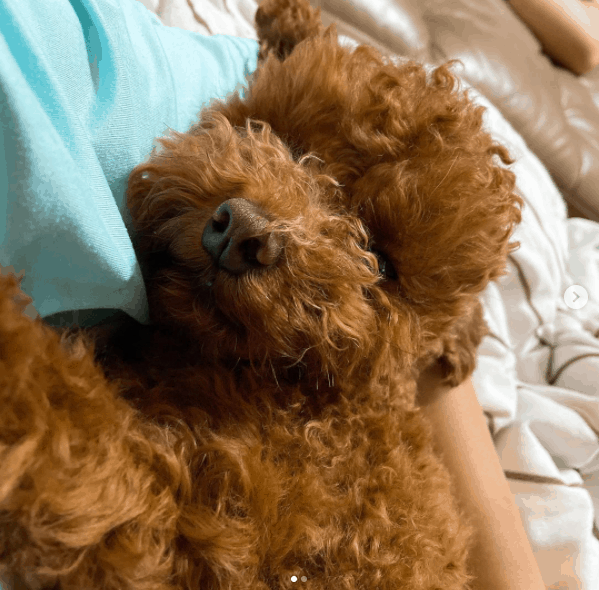
• Older dogs can suffer from cognitive impairments as their brain cells begin to atrophy.
Although there is no actual cure, the symptoms can be managed through a routine of exercise, diet, and training, coupled with vitamin supplements and drugs.
The most important thing to remember is that most of the time, restlessness at night isn’t usually down to something serious.
Pups will grow out of it, adult dogs might be adjusting to change, and senior dogs could be showing signs of old age, which can be managed to some extent.
Your best course of action is to monitor their behavior closely and get them checked out by the vet at least twice a year.
Nothing will stop you from worrying about your fur-baby at times, but you can ease your own anxiety by catching any problems early to give your pet the best chance of recovery as well as a long and full life.
Read Next: My Dog Is Pacing And Won’t Lie Down – What’s Wrong?
